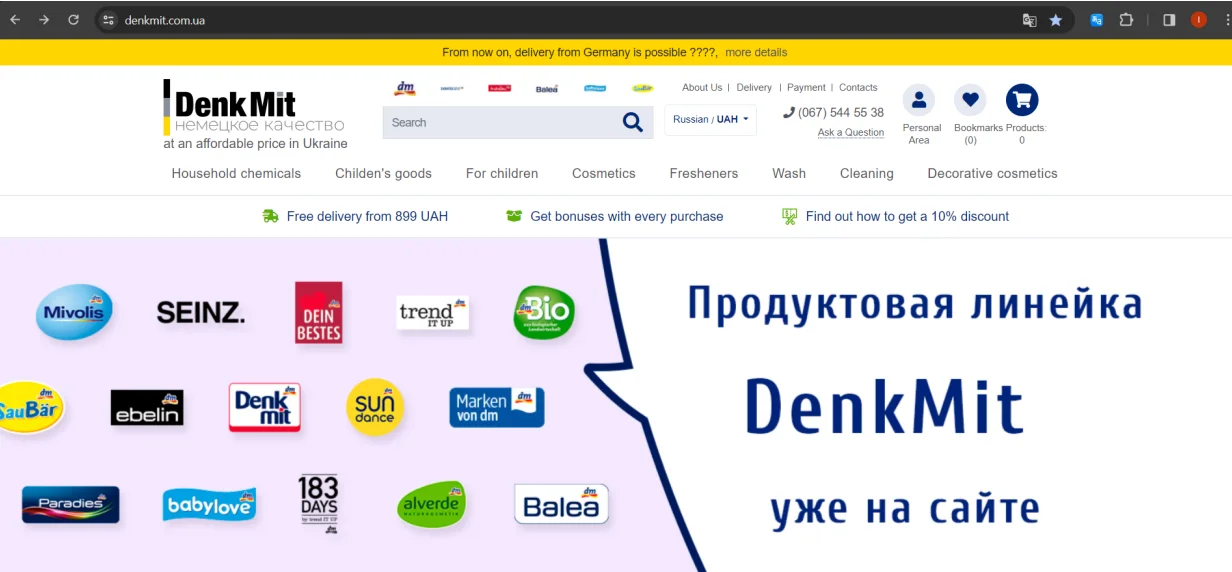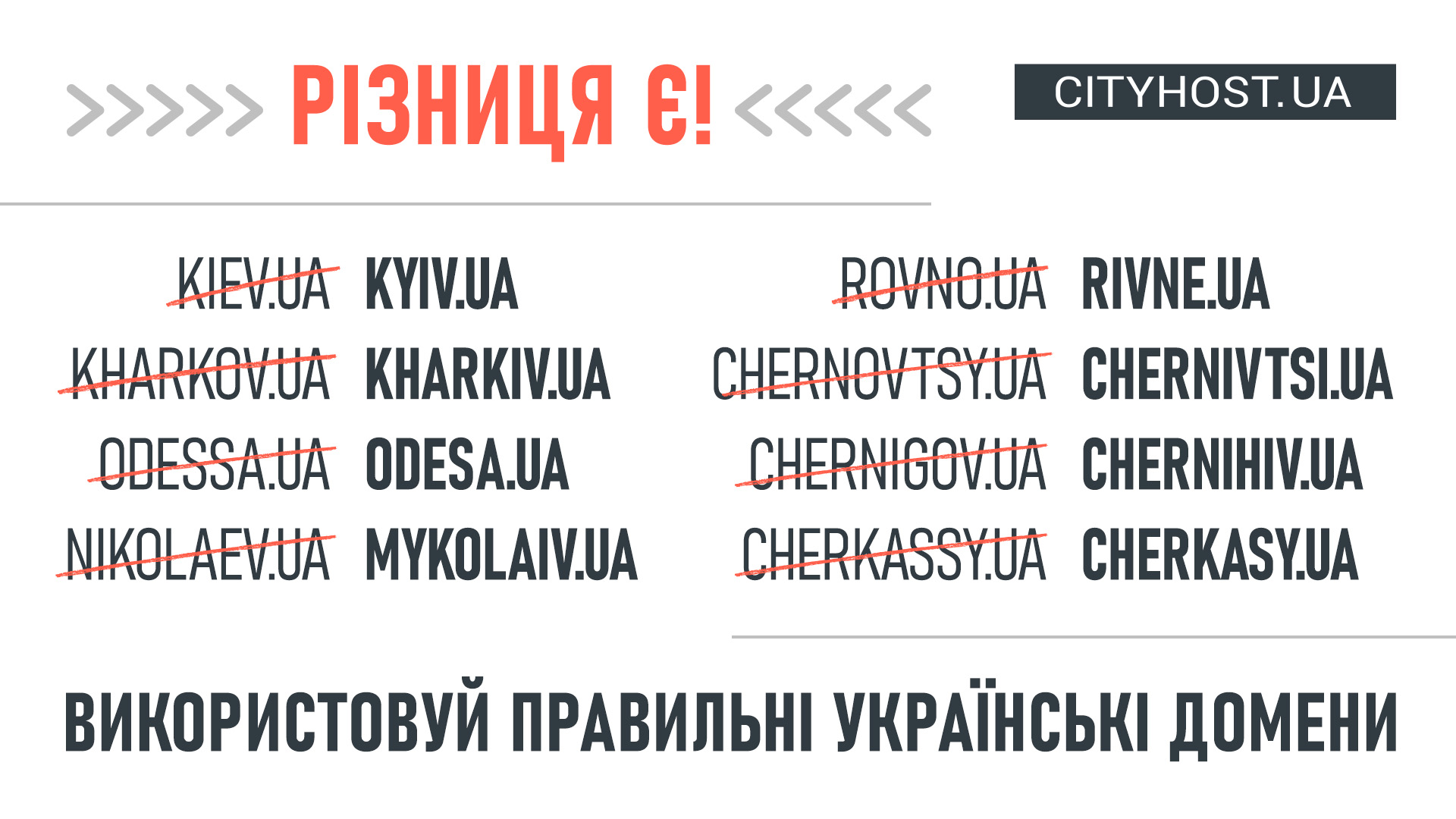
- Prerequisites for Filing the Complaint
- First Stage — Filing the Complaint
- Cityhost Joins the Procedure: What Steps the Registrar Takes During UA-DRP
- Commencement of Administrative Proceedings
- Decision to Transfer the Disputed Domain Name to the Plaintiff
- In Conclusion
Recently, with the participation of Cityhost, a complaint under the extrajudicial UA-DRP procedure was successfully resolved. The case involved the violation of intellectual property rights through the use of a domain name. We tell you about the course of this domain dispute, with all the intricacies and details — this material will be useful and help you defend your rights in a similar case.
Domain names often become the target of fraudulent schemes. Business owners frequently face cybersquatting, where fraudsters register a domain deceptively similar to the name of their brand to use it for malicious purposes.
For instance, this may involve selling counterfeit goods on the site or demanding a large sum to ransom the domain. Since this is a violation of intellectual property rights, original domain owners can defend their rights in court or use a simpler dispute resolution procedure available in Ukraine — it's called UA-DRP.
We have already written an article about what UA-DRP is and how to defend your right to a domain, so you can find all the basic information about this procedure there.
In brief, UA-DRP is a practice of pre-trial domain dispute resolution, a simpler and more convenient alternative to court proceedings. For example, if a user registers the domain abibas.com and starts selling counterfeits through it, the original manufacturer has the right to contact the World Intellectual Property Organization (WIPO) with a request to transfer the disputed domain to the plaintiff as the organization that owns the corresponding trademark and has the right to use the name Adidas in its business activities.
Prerequisites for Filing the Complaint
A similar situation occurred with the plaintiff company, which filed a complaint with WIPO. The German company dm-drogerie markt GmbH+Co, the owner of the DenkMit trademark, submitted a claim regarding the unlawful use of the domain denkmit.com.ua. The domain owner was selling products of this and other companies in Ukraine through the website, without being an official distributor and without permission to use the DenkMit trademark. Company dm-drogerie markt is the owner of registered and globally protected trademarks "denk mit", including in Ukraine, and has been operating in the market since 1997, earning a solid reputation among customers.
The content of the website hosted on the domain denkmit.com.ua included offers to sell numerous products belonging to the plaintiff, marked with its trademarks such as denk mit, Alverde, dmBio, Mivolis, Balea, Seinz, as well as products from other manufacturers — Disney, Nivea, Palmolive, Johnson's, Calgon, Persil, Perwoll, Vanish, Silan, and so on.
The owner of the disputed domain "borrowed" not only the name of the popular brand but also its logo, which was used on the site as a favicon.

This is how the website hosted on the domain denkmit.com.ua looked
Usually, the first step in such cases is to contact the infringer with a request to voluntarily stop using the trademark in the disputed domain and to remove other materials for which there is no permission — logos, product photos, and other content.
This is exactly what the representatives of dm-drogerie markt did — they made several attempts to contact the domain owner and inform them of the trademark infringement.
It should be noted that at that time, the name and contact details of the domain owner were not precisely known, so the representatives of dm-drogerie markt contacted the "predictable registrant" — the person whose contact information was listed on the website.
In particular, the authorized representative of the plaintiff made a phone call in May 2017 to inform the infringer about the use of the trademarks without permission, but the registrant did not respond to the notice.
Several letters were also sent, demanding that the trademark infringements related to "denk mit" be stopped, to the email address provided on the website under the disputed domain name, but these demands were ignored.
Afterward, the complaint procedure was initiated to gain ownership and control over the domain name denkmit.com.ua.
Also read: Scammers on Facebook — How to Protect Your Business Page from Theft
First Stage — Filing the Complaint
On 26.04.2024, a representative acting on behalf of dm-drogerie markt GmbH + Co filed a complaint with the WIPO Arbitration and Mediation Center.
In the plaintiff's opinion, it was clear that the respondent had no rights or legitimate interests in the disputed domain name, as none of the following conditions were met.
- The respondent is neither a licensee nor an authorized agent of the plaintiff, and there is no other basis for the use of the trademarks in the disputed domain name.
- It is not known that the infringer had a name or pseudonym, or was registered as a legal entity or any organization under the name Denk Mit. A search for the disputed domain name in Google shows that the results mainly concern the plaintiff and its activities, offering the domain name dm.de as a search criterion. No evidence was found that the respondent had any rights to the trademark in the disputed domain name or had ever operated under the name "denk mit".
- No evidence was found of any use or clear preparations to use the disputed domain name in connection with a bona fide offering of goods or services before any notice of the dispute.
So-called unauthorized resellers or distributors may register new domains and create websites to sell original manufacturer's products — and this would be legal, even if they have not received official permission to use the trademark name in the domain.
To determine whether such activity violates the law, WIPO has established a number of conditions — if they are met, the use of the trademark in the domain will be considered a bona fide offering of goods and services.
This check is called the "Oki Data test", named after the domain okidataparts.com, the dispute over which gave rise to this test.
Here are the conditions:
- The agent's website must indeed offer services or goods of the specified company.
- The website must be used only to sell the services or goods of the specified manufacturer.
- The website must clearly disclose the relationship between the reseller and the trademark owner.
- The respondent must not attempt to "corner the market" of domain names that reflect the trademark.
In this case, at least two conditions of the Oki Data test were not met, namely 2 and 3 — the website featured products from various manufacturers, and there was no clear information provided regarding the relationship with the plaintiff company.
Therefore, based on all of the above, the infringer consciously used the trademark name and its visual components to deceive internet users. Visitors to the website were purchasing products believing they were dealing with an official representative, though this was not the case. The domain owner used the image of the German company to sell goods and for personal enrichment, in violation of the law, and as a result, their actions can be considered unscrupulous, justifying the demand for the transfer of the disputed domain to the plaintiff company.
Cityhost Joins the Procedure: What Steps the Registrar Takes During UA-DRP
On April 29, we received a letter from WIPO with a list of actions and a request to confirm information about the client.
While the previous steps of the procedure involve determining the possibility of the plaintiff's rights being violated and the improper use of the domain by the registrant, now it's necessary to obtain exact information about the infringer. Therefore, WIPO requests the following information from the registrar:
- country of registration;
- confirmation that the domain is registered with this organization;
- date when the domain was registered (if possible);
- date when the domain expires;
- language of the registration agreement;
- first and last name of the current registrant;
- all contact details to reach the respondent;
- confirmation that the domain is subject to the Dispute Resolution Policy;
- confirmation of the domain's lock until the UA-DRP procedure is completed.
It should be noted that client data is confidential and not provided to third parties upon the first request. As the Public Contract of Cityhost.ua states, we are obligated to "Maintain the confidentiality of customer information received during registration".
However, the Public Offer also contains a rule regarding the UA-DRP policy, which obligates us to: "Provide requested information to the International Intellectual Property Organization's Arbitration and Mediation Center, including confirmation that the disputed domain name is registered by the contractor for the client, that the domain name is registered by the individual or legal entity indicated as the respondent in the complaint, and to provide the contact details of the registrant of the disputed domain name. If necessary, provide the domain registration and maintenance agreement, as well as other documents".
Following all rules and regulations, we provided all necessary information. We also applied the following statuses to the domain denkmit.com.ua:
- clientTransferProhibited
- clientUpdateProhibited
- clientDeleteProhibited
We applied the following statuses to the contact:
- clientUpdateProhibited
- clientDeleteProhibited
We also informed the client about this.
Also read: Workplace Cybersecurity — Information Hygiene Rules for Company Leadership and Employees
Commencement of Administrative Proceedings
At 14:05, we received a notification about the commencement of administrative proceedings, the information of which we are required to pass on to the owner of the disputed domain.
At this stage, the respondent still has the opportunity to settle the dispute amicably. To do so, they must submit a request to suspend the review process for up to 20 days (this rule applies during martial law). During this time, the respondent can contact the plaintiff and agree on a solution that satisfies both parties.
If the dispute is resolved at this stage, a standard WIPO settlement form is completed, and the fee paid by the plaintiff for the commission's work is refunded.
Since the respondent did not make any attempts to resolve the issue directly with the plaintiff, the complaint review by the commission was scheduled.
Decision to Transfer the Disputed Domain Name to the Plaintiff
On July 15, we received the commission’s decision to transfer the domain name to the plaintiff. We informed the client about this.
According to the decision, the domain registrar, Cityhost, must begin executing the aforementioned decision on the tenth business day after receiving the notification.
However, the respondent still has the opportunity to defend the domain if they believe the commission’s verdict was unjust. During these 10 days, they can provide the registrar with an official document proving they have initiated legal proceedings against the plaintiff.
Additionally, under martial law conditions, the respondent can request an extension of up to 14 calendar days to submit the necessary legal documents.
Since the respondent did not take this step, we proceeded with the domain transfer to the owner of DenkMit trademark within the specified time frame.
In Conclusion
Every business with a well-established reputation on the market risks becoming a victim of phishing, cybersquatting, and counterfeit activities. This situation demands constant vigilance and proactive measures in case opportunistic entrepreneurs decide to profit from a brand's image without investing time, effort, or resources in building it. Large companies often preemptively buy up domain names that could become contentious, for example, those incorporating their brand name across various domain zones. They then set up redirection to the primary domain, so users end up on the official website regardless of the address they enter.
Plaintiffs are not always successful in reclaiming disputed domains — for instance, if the respondent was using the name before the plaintiff registered their trademark. In some cases, disputes can't be resolved under the UA-DRP framework, making it necessary to either pursue legal action in court or accept the situation as it is.
However, in the case discussed in this article, all signs pointed to the improper use of the domain. The respondent made no attempt to defend their right to the domain, which led the commission to make a swift and unequivocal decision in favor of the plaintiff.










